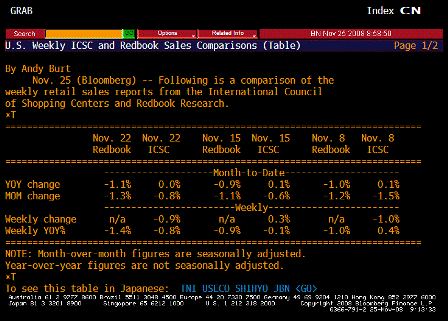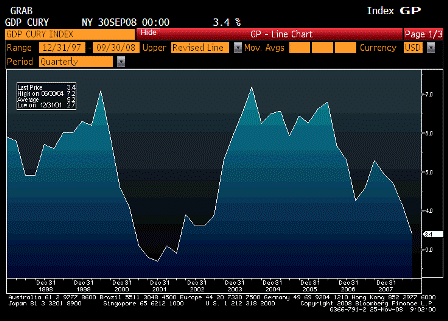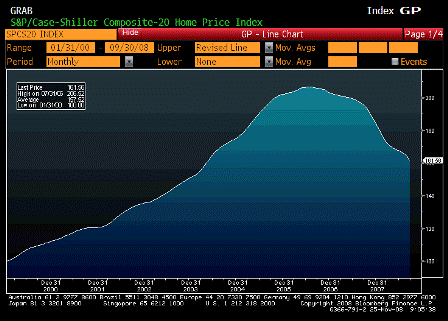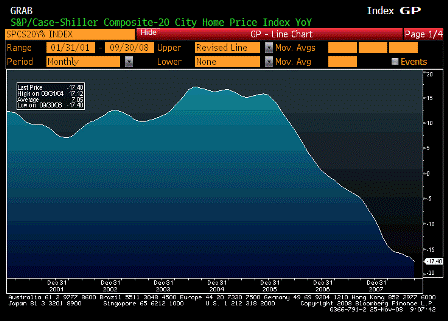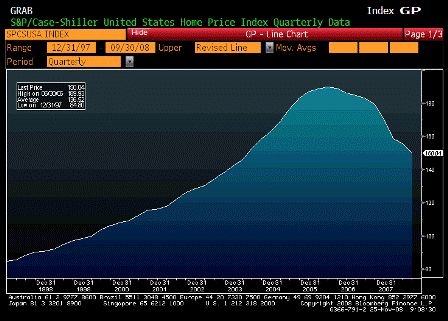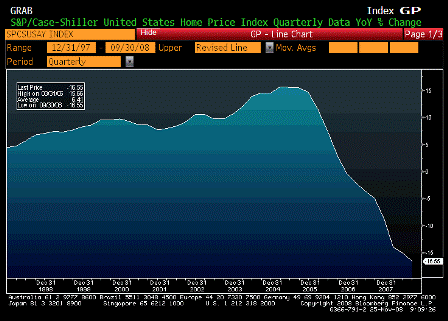(email exchange)
>
> On Tue, Nov 25, 2008 at 2:22 AM, Michael wrote:
>
> Warren: If you get a moment, I was wondering what your reaction is to
> this latest Heritage Foundation analysis below. This is certainly an ideal
> time for our message–new administration, public looking for new
> answers, skepticism about the downside of deficits, and hugely
> challenging economic stagnation that almost certainly requires new
> thinking. –Michael.
>
You got it!
See below:
How to Successfully Stimulate the Economy
When the economy is struggling, Congress has a tendency to invoke the same tried and failed policies of the past. Typically, these policies promise hundreds of billions of dollars in government spending while doing little to actually revitalize economic activity. The first round of stimulus checks, like those rebates issued in the 1970s and 2001, were a bust, with only a small portion (perhaps less than 30 cents on every rebate dollar) used for consumption. Furthermore, prior government spending on infrastructure such as highways merely transferred–rather than created–wealth.
The 2001 fiscal adjustment was too small to reverse the negative effect of the surplus years that caused the collapse. The 2003 adjustment was much larger and had a larger effect and did result in reasonable growth, but that growth was allowed to bring the deficit down to where it was too small to continue to support growth and employment.
The sub prime fraud driven credit expansion did help prolong the post 2003 upswing, but that boost ended when the fraud was discovered and demand from housing slowed.
During the current period of slow economic growth, Congress should do what it does best: set broad economic policy. Specifically, Congress should concentrate on signaling to investors and workers alike that its principal focus will be on improving pro-growth economic policy, mainly in the areas of tax, energy, and spending policies. The test for distinguishing good stimulus ideas from bad ones should be this: Is the proposal likely to raise the economy to a sustained, higher level of growth?
The broad choice is whether to foster an increase in the consumption of private or public goods.
Tax cuts, for example promote private consumption, where infrastructure spending, for example, is public consumption.
Public consumption can be for short term private consumption (law enforcement, public ceremonies, etc) or for investment in public goods for long term private consumption (building roads for economic investment, monuments for well being investment, etc)
In any case, a growing economy in general requires spending exceed tax liabilities on a continuous basis.
Tax Policy
What can increase risk for investors and businesses? Many factors, of course, but public policy commonly looms largest. For example, tax increases, especially on capital, increase the cost of capital and lower investment returns. When investors are uncertain about whether taxes will increase or stay the same, they can still act as though taxes have risen if they judge the risk of an increase to be nearly equal to an actual increase. And rising uncertainty can have the effect of driving down investments in riskier undertakings. Congress can take the following actions on tax policy:
- Make the Tax Reductions of 2001 and 2003 Permanent.
Among the first actions Congress can take to address the current economic slowdown is to make a definitive statement regarding the tax increases scheduled for 2009 and 2011. There are projects, new businesses, and expansions of existing businesses that would be undertaken today if Congress signaled that taxes would be lower in three years.
Maybe some, but the problem now is lack of sales. Taxes that are only on profits aren’t all that influential when profits and sales are expected to decline. While after tax income is always welcome, I’m sure most businesses would vote for an increase in sales as more beneficial than a decrease in tax rates? For example, the autos have operating losses, so tax rates would not alter investment decisions?
- Since nearly all major capital undertakings last beyond this three-year period, it is likely that making all or most of the Bush tax reductions permanent would stimulate economic activity today as well as in 2011. If Congress increases taxes, then investors will find more favorable economies to support and business owners will, as much as they can, locate their expanded activities in other countries with more favorable tax regimes.
The lower taxes are needed to increase current output and employment via increasing sales. Countries that have high rates of employment in an environment where business can profit attract investment, as in the US in the late 90’s.
- Accelerate Tax Depreciation
Past economic slumps have proven that accelerating the tax depreciation of capital equipment and buildings or the one-year expensing of business purchases that would otherwise be depreciated over a longer period of time for tax purposes can help during periods of slow growth.
I would suggest that depreciation attempt to follow the actual useful life of assets to not distort investment decisions.
- Lower the Corporate Profits Tax.
In one area of tax policy, there is now nearly universal agreement: Our federal business taxes are far too high. The U.S. tax rate on corporate profits is the second highest in the world. Why is it not the firm policy of this country’s government to ensure that the corporate profits tax is always below the average corporate income tax of other industrialized countries? Such a policy would enhance our competitive standing worldwide and significantly reduce the incentive for U.S. firms to relocate to lower tax countries.
There is a valid argument that corporate profits not be taxed at all, as the profits are passed through to investors, who should show the income on their annual earnings, as with sub S- corps and LLC’s.
The current 30% corp tax rate and 15% dividend tax get pretty close to this but are still higher than the highest personal income tax rate.
By making the 2001 and 2003 tax reductions permanent and reducing the corporate profits tax by 1,000 basis points, an annual average of 2.1 million more jobs would be created. Indeed, 3.4 million jobs above a current law baseline would be created in 2018 by newly energetic businesses.
Only if there is an increase in sales (retail and wholesale).
I don’t think that proposed adjustment reduces taxes enough relative to government spending to return us to levels of output coincident with, say, 4% unemployment.
These tax changes dramatically increase the level of national output, and household income rises as the result of a healthier economy and lower taxes. In fact, the average household would have $5,138 more to spend or save after paying their taxes, and by 2018 this amount would jump to $9,750.
The initial adjustment isn’t that high and investment made without a population that has sufficient income to buy the new output will not result in a healthy economy, but instead more of what we have now.
Energy Policy
Rapidly increasing prices for gasoline and petroleum-based energy slowed the economy and helped bring about our current recession. Additionally, the effects of such increased energy prices continue to impede job and income growth. If Congress acts to expand energy supplies, forward-looking prices will fall and economic activity will shed off the drag stemming from this sector.
Without cutting gasoline consumption first, any expansion will help the Saudis (currently the only crude exporter with excess capacity) should they decide to again hike crude prices.
The Heritage Foundation’s Center for Data Analysis analyzed the economic effects if domestically sourced petroleum increased by 2 million barrels per day, and it found that such an increase would expand the nation’s output–as measured by the Gross Domestic Product–by $164 billion and increase employment by 270,000 jobs annually.
Yes, it may eventually (10 years down the road) expand output by that much, but during the next few years the increased employment and income you predict would increase gasoline consumption and support higher prices that would reduce our real terms of trade and siphon off our real wealth via the export channel, thereby reducing our real standard of living.
If Congress were to announce greater access to proven reserves, mining activity would immediately begin, capital and talent would leave other parts of the world and travel to the U.S., forward-pricing markets would feel the downward pressure on prices as the result of impending supply increases, and ordinary Americans’ concerns over their economic future would lessen.
I’d guess supply increases in petroleum of only 2 million barrels a day pending for 10 years in the future will not offset the immediate consumption increase.
The other, more fundamental issue is whether we want economic growth that increases energy consumption via burning things.
(Though with all the geopolitical problems associated fossil fuels I’ve often thought it would be nice to use them all up as quickly as possible and get it over with, behind us, and move on…)
Spending Policy
While the attention of most policymakers will be on immediate responses to the current slowdown, the seeming unwillingness of Congress to seriously address the enormous financial challenges from entitlement spending should not go unnoticed.
Many investors and organizations that play key roles in the future of the U.S. economy are worried about long-term growth given the fiscal challenges posed by Social Security’s and Medicare’s unfunded liabilities.
The challenge is only that of any future inflation that spending might induce. Clearly, however, that is not a concern as no one has ever published an inflation warning from those programs. And no one has expressed concern that the elderly are consuming too many real resources, or that as a nation we should reduce health care services.
At a time when the economy is slowing and the voice of Congress, as well as its actions, can affect economic activity, policymakers should take concrete steps that will announce their intention to address unfunded liabilities in these important programs. While reforms in these programs may be beyond what this Congress can accomplish, it is possible to signal change by reforming the budget rules.
As above, until there is a case to make that those expenditures will cause politically undesired levels of inflation there is no evidence of a ‘problem’.
Additionally, even if it were deemed future inflation was an issue, taking actions that would reduce aggregate demand today and thereby decrease current output and employment is necessarily counter productive.
Currently, the federal budget functions on a pay-as-you-go system, with a very limited forecast of obligations and supporting revenues. It is impossible for the official budget to predict what may happen over the next 30 years; the five- and 10-year budget windows do not permit Members of Congress or the general public to sense the obligations that are coming beyond that 10-year horizon. However, Congress can take two important steps in addressing the long-term entitlement obligations of the U.S.:
- Show These Obligations in the Annual Budget.
This could be done by amending the budget process rules to include a present-value measure of long-term entitlements. Such a measure would express in the annual budget the current dollar amount needed today to fund future obligations. Such a measure has been endorsed by a number of accounting professionals, as well as the Federal Accounting Standards Advisory Board.
This would be an interesting exercise that can also include the estimated ‘demand leakages’ that reduce aggregate demand, such as pension fund contribution, insurance reserves, IRA contributions, etc. and add to the need for spending to exceed taxes to sustain output and employment.
I would expect this calculation to show that future government deficits continue to fall short of the projected demand leakages, as has been the case in generally since 1945.
- Convert Retirement Entitlements into 30-year Budgeted Discretionary Programs.
Such a move recognizes that mandatory retirement funding programs for millionaires that crowd out discretionary spending programs for homeless war veterans.
Government spending can only be ‘crowded out’ by inflation fears due to lack of real output capacity. With today’s excess capacity, and projections of future excess capacity, we can readily afford any additional desired government spending for homeless war veterans.
- do not make any sense at all. If we are to contain entitlement spending and reform the programs driving those outlays, then a paradigm shift will likely be required. Recognizing Social Security and Medicare as discretionary programs helps to force attention on changes that will assure their survival well into the 21st century.
We can readily afford any additional spending as long as there is excess real capacity.
Greater Predictability, Greater Productivity
Serious work by the Congress on tax, energy, and spending policy will create greater predictability for investors and business owners and assure workers that they will have a better chance of improving their wages through increased productivity.
Right, and a long term plan by Congress for its expenditures will be the backbone driver of that growth.
Efforts to enhance this nation’s long-term economic health may very well have immediate, short-run benefits as economic decision makers reduce the risk premium they place on starting new businesses or expanding existing enterprises.
Business has a long history of tagging along on the lead taken by Congress from its direct spending and incentives it puts in place.
[top]







